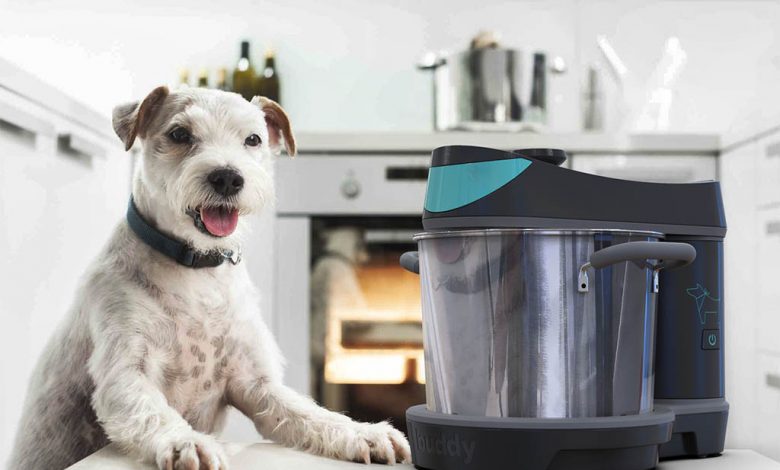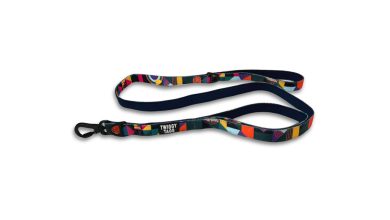Leaders of the Pack

Joe Inglis of Vet Chef and Ben Sweeney of Vidivet are pushing the technological boundaries of how they offer their vet skills to dog owners and what’s more, they are bringing the veterinary world truly into the 21st century by doing so.
How did Vet Chef come about and why?
I’ve been interested in home-cooking for pets for many years – I wrote a recipe book for dogs called ‘Doggie Dinners’ back in 2006 – but it was only after leaving tails.com in 2015 that I started looking at it more seriously. I realised that home-cooking could allow pet parents to feed their dogs a wonderful, fresh, and healthy diet that could be completely personalised to their individual needs, but also that there were several hurdles preventing more people from trying this type of feeding. The main barriers were a lack of easily available nutritional expertise, and the hassle factor, so I set up VetChef to provide solutions to these problems and help more people and their dogs enjoy the benefits of healthy home-cooked food.
Is the Vet Chef app free?
Yes, the VetChef app is completely free – just head over to vetchef.com to sign up and get your dog’s personalised recipes.
As well as the recipes, we are also developing Buddy, the world’s first fresh pet food maker which is like a bread machine but for home-cooked dog food. It’s going to make the whole process of cooking batches of food for your dog super-easy – just load in the ingredients and Buddy will chop, mix, and cook to create the perfect meals for your dog. We hope to be launching Buddy later this year or early in 2022.
As a vet, how important is it that Westie owners feed a healthy natural diet?
Over my years as a vet I’ve seen countless Westies, many of them suffering from the typical issues that affect the breed such as atopic dermatitis, and I’ve also seen how effective a role healthy nutrition can play in helping address these issues. So, I’m convinced that feeding a healthy, fresh diet is one of the key ways in which Westie owners can help promote long-term health in their dogs. In addition to the general benefits that fresh food can bring, for Westies with diet-related skin problems, home-made diets also make it very easy to exclude specific ingredients that might be triggering problems – and the VetChef platform helps with this by allowing you to select which ingredients to exclude from your dog’s recipes.
You also founded Vet’s Kitchen and Tails.com both of which include kibble. Do you think Kibble is a healthy food? Many people are turning to a raw food diet.
I’ve been involved in the pet food world for many years, including with Vet’s Kitchen and tails.com, and I think that there are advantages and disadvantages of all the different ways of feeding our dogs. Good quality kibble can be fine, and many dogs thrive on foods such as Vet’s Kitchen, and it is definitely more convenient than home-prepared diets – and raw food can also work well for some dogs. But personally, I now believe that of all of these ways of feeding, freshly home cooked food offers the best overall level of nutritional quality, and this way of feeding is set to become mainstream over the next few years.
Why is it important for vets to become more innovative?
Like any professionals and businesspeople, vets need to move with the times or be left behind. A good example is the Vet’s Klinic practice in Swindon that I set up in 2013 – this practice was the first in the UK to offer online booking and access to medical records and pioneered an open and transparent approach to veterinary and customer care which has become much more widespread in the years since it launched. Innovation and technology can play a massive role in improving the way in which we care for our pets, just as it does in human health care and nutrition.
As amazing as technology can be, is there a danger that a vet launching a business loses credibility as a vet?
Personally, I don’t think so – nearly all vets in the UK are in business anyway, as most practices are private enterprises, so it’s normal for vets to combine clinical work with business.
Do you still have patients or are you focusing on your business?
I haven’t been in clinical practice for a few years now, since leaving Vet’s Klinic. Much as I enjoyed the work, and particularly interacting with the patients and their owners, I felt that I wasn’t able to keep up my skills to the required level when spending so much time away from the surgery working on other projects. So, reluctantly, I hung up my stethoscope and made the decision to use my veterinary experience to help pets in another way, through nutrition rather than medicine and surgery.
Tell us three things you’ve learnt from Pip!
Pip is a lovely dog who has taught me a lot since she came into our lives just over a year ago, including:
- Deer must smell very good to dogs – as soon as Pip catches scent of one, she’s off on the chase (but thankfully never actually catches her quarry!)
- Communication between dogs is very complex – watching Pip ‘talk’ to other dogs with her body language is fascinating but can be very hard to follow and predict whether the outcome of any particular meeting will be playful wags or curled lips and teeth!
- Feeding a fresh home-cooked diet has been as good for me as it has been for her – the process of planning, cooking, and serving Pip two fresh meals a day has been surprisingly enjoyable for me, as well as being wonderful for Pip who absolutely loves her meals. There’s something amazing about being able to repay her unconditional love with a dish of delicious, home-made food that you just don’t get when scooping up kibbles from a bag
How difficult is it to create bespoke meals for dogs you can’t see?
We’ve designed a really smart system that takes all of the data about a dog – age, breed, weight, lifestyle etc – and uses this information to select and then adjust the recipes in the database. So, it’s been a massive amount of work to create, but now the system works really well, and creates bespoke recipes in milliseconds!
How rewarding has it been creating your dog food businesses?
I’ve found my career in pet food to be just as rewarding if not more so than my veterinary career, and I feel that I’ve definitely achieved more in terms of promoting animal wellbeing and health through nutrition that I could ever have done working ever day in a surgery.
What kind of food/recipes would you recommend for Westies?
With their predisposition towards skin problems, recipes rich in omega 3 oils, such as fish are great for Westies. Other ingredients that can play a positive role in skin health include Brewer’s yeast, rosemary (with high levels of vitamin A and anti-allergy properties), and fresh vegetables of all kinds.






